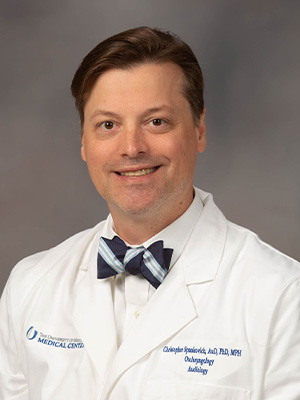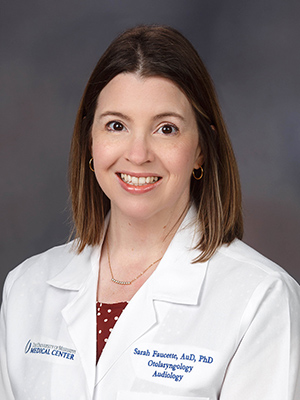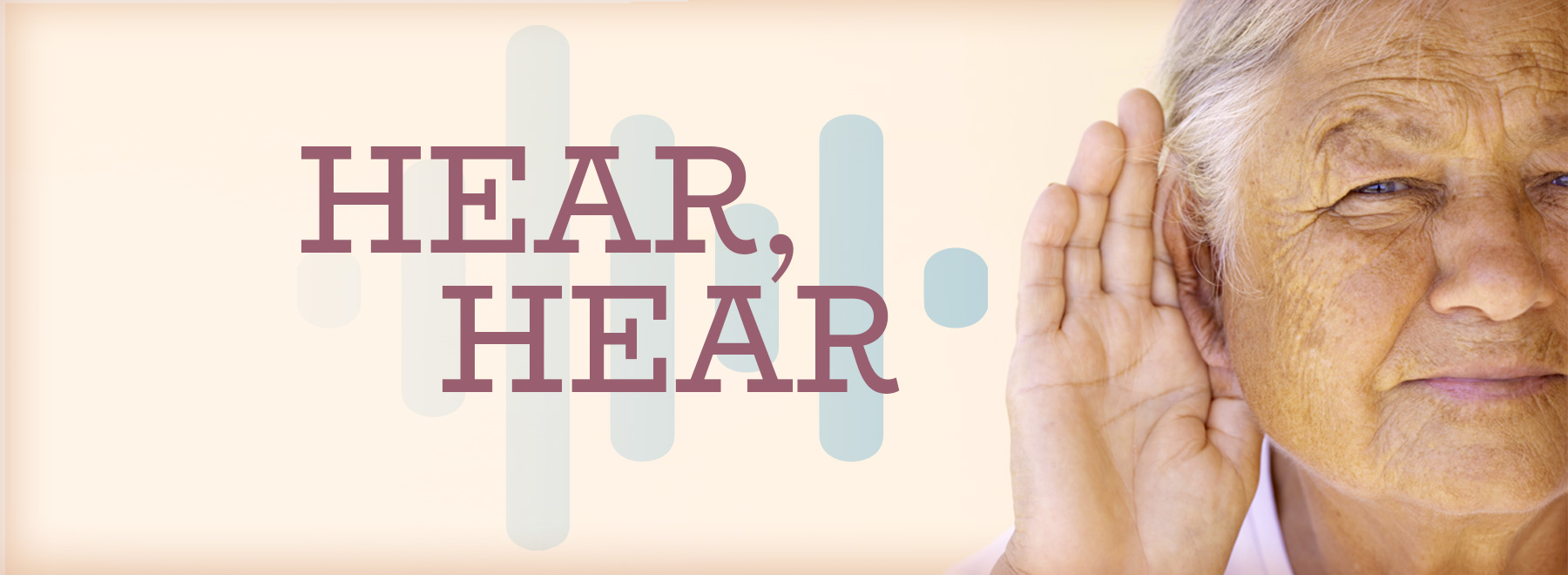When it comes to hearing loss, listen to reason
This is not just a lot of noise: Some 44 million U.S. adults age 20 or older have some degree of hearing loss.
The condition affects around one-third of those 65 and older. But it is also highly preventable, experts at the University of Mississippi Medical Center say.

Aging is one of the most common reasons for sensorineural hearing loss – loss caused by damage to the inner ear, said Dr. Christopher Spankovich, professor of otolaryngology – head and neck surgery at UMMC. Another is taking certain ototoxic medications – those with properties that can lead to damage to the inner ear.
“But the most common cause is noise exposure, which can cause hearing loss at any age,” he said.

In Mississippi, that often means the blasts and blares from hunting rifles, power tools, and lawnmowers or other lawn care equipment, said Dr. Sarah Faucette, associate professor of audiology in the Department of Otolaryngology – Head and Neck Surgery,
“When it comes to fireworks or gunfire or other louder sounds, less exposure is required to cause hearing damage.”
If you’re a construction worker, farmhand, factory worker or musician, etc., clamor and clatter come with the territory, in which case, the federal Occupational Safety and Health Administration (OSHA) requires that your employers provide hearing protection for you, Faucette said.
If you work on your own, embracing safeguards is up to you. “With your own lawn-mowing business, for instance, you could be exposed to equipment noise more than three or four hours a day, and that can cause damage,” Faucette said. “In that case, I would use in-the-ear protection; even the cheap earplugs you can buy in a pharmacy will work, if you use them according to instructions.”
Physical trauma, exposure to chemicals, neurological disorders and – especially for children – heredity factors can lead to hearing loss.
But most of the cases Faucette sees are merely the result of staying alive. “As the body changes during the aging process, it’s typical to have at least some hearing loss or damage,” said Faucette, who researches age-related hearing loss within the Memory Impairment and Neurodegenerative Dementia Center at UMMC.
Within that process is a nest of saboteurs, Spankovich said. “You’ve had a lifetime of accumulated noise exposure, for one. Other factors are your overall health, cardiovascular health, metabolic health and so forth.”
Your hearing-loss risk also rises if you take certain drugs; in the U.S., the two most ototoxic medications are the chemotherapy treatment, cisplatin, and aminoglycosides: antibiotics, such as amikacin, reserved for severe infections, Spankovich said.
“There are other drugs with lower levels of potential toxicity, depending on how high the doses are, duration of use and how they’re delivered.”
Over-the-counter painkillers, such as aspirin, are potential culprits, “but only when taken in high doses and for an extended duration,” Spankovich said.
“One recently identified ototoxic drug is Tepezza, used to treat thyroid eye disease, but it is not used in high numbers.
“For more than 90 percent of hearing loss cases in adults, the cause is noise exposure, drugs or aging. But 10 percent are related to diseases of the ear, including the inner ear, such as Meniere’s disease.”
Symptoms of Meniere’s disease include fluctuating hearing loss, vertigo (a spinning sensation) and roaring or buzzing in the ears known as tinnitus.
“However, tinnitus is also a common side effect of hearing loss,” Spankovich said. “The brain is trying to compensate for reduced input and the result is often a perception of ringing or buzzing.
“We can’t cure tinnitus, but we can offer management strategies so that patients habituate and learn to reduce their perception and reaction.
“If you have tinnitus, get your hearing tested. Also, if you’re noticing greater difficulty in following conversations on the phone or hearing the TV, or you’re having challenges talking with loved ones, especially when there is noise in the background, you should get your hearing tested.”
Now, just in time for National Save Your Hearing Day, May 31, Spankovich offers three broad approaches for preventing hearing loss or reducing its scope:
Primary prevention: This means, for instance, and for those still young enough, getting your hearing screened in your 20s or 30s. It means wearing hearing protection around loud sounds. “Also, just eat healthy and exercise: These measures won’t prevent hearing loss, but can minimize some health-related factors as you get older.”
Secondary prevention: As soon as you notice symptoms of hearing loss, schedule a hearing evaluation. You should get a test anyway by age 55, if you you’re a female, and by age 45 if you’re a male. “These are the sweet-spot ages where people begin experiencing age-related hearing loss, but not necessarily significant loss.” Also, as with primary prevention, healthy eating, exercise and other lifestyle measures, including the use of hearing protection, are important, he said.
- Tertiary care: When hearing loss is already diminishing your quality of life, “we talk about how to improve communications and listening skills, interactions with others,” Spankovich said. He also recommends observing healthy habits and avoiding certain medications. Finally, you may need a hearing aid, cochlear implant, bone-conduction implant or other procedure or device.
“If you’re noticing hearing challenges, don’t just blame it on the speaker or the environment,” Spankovich said. “Get your hearing checked and learn about different options that can treat it.”
If you have ear pain, drainage in the ear, a sudden change in hearing, issues with only one ear, or episodes of dizziness, Spankovich advises seeing an ear, nose and throat (ENT) specialist. “An ENT can help rule out medical pathology [disease or injury] related to hearing difficulty,” he said.
“See an audiologist and/or an ENT depending on your symptoms and let them evaluate what’s going on; they can give you recommendations for your individual needs.”
— — —
For more information, or to make an appointment: /Healthcare/Hearing/Hearing_Home.html.
The above article appears in CONSULT, UMMC’s monthly e-newsletter sharing news about cutting-edge clinical and health science education advances and innovative biomedical research at the Medical Center and giving you tips and suggestions on how you and the people you love can live a healthier life. Click here and enter your email address to receive CONSULT free of charge. You may cancel at any time.



